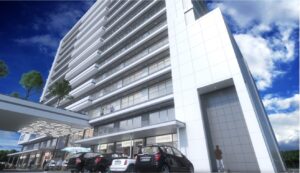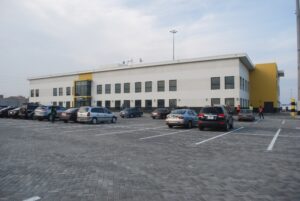Stories
Going Green in Ghana Means Business
With a rapidly growing economy, but limited natural resources, EDGE certification offers an ideal solution for the private sector in Ghana.
Ghana is on track to have the highest GDP growth rate in the world for 2019, tied with South Sudan at 8.8 percent, according to the World Economic Outlook’s April 2019 report. The country has emerged as a leader in the African economy, beckoning more companies to come and do business in Ghana. But with high costs of electricity and frequent water shortages, companies are searching for resource-efficient ways to reduce costs and stay ahead of the competition.
For many, EDGE certification offers a solution.
Green Makes Business Sense
From the early design stages of the Atlantic Tower, Radwan Dakmak, Managing Director of Meridian Ghana, didn’t even consider constructing an office building that wasn’t resource-efficient. Dakmak saw building green as a marketing strategy that could bring greater value to his customers. Today, being able to call his building EDGE-certified brings worldwide recognition to his project.

Developed by Wahhab Estate Co. Ltd and located in the heart of Accra, the Atlantic Tower has received final EDGE certification from thinkstep-SGS.
EDGE certification has also helped him secure major multinational firms to establish their Accra offices in the Atlantic Tower, which sits within Airport City, a rapidly growing commercial hub in the heart of the capital. Dakmak knew that by designing the tower green, he would outpace his competition. “With this market, you need to be one step ahead,” he said. “It was my vision to have a resource-efficient building, which became a good marketing tool for us.”
For Dakmak, building green results in better profits for his customers. By installing green features such as energy-efficient air-conditioning, occupancy sensors and water-efficient fixtures, Meridian Ghana can pass on the value to its tenants who will have lower utility bills. For firms that are customer-centric, the value of green far outweighs any added costs.
“Any rational business man wouldn’t opt for a non-green building,” said Dakmak. “The benefits are far more than the added costs.”
From the City to the Sea
A short distance from the city, the Tema Port connects Ghana to the rest of the world. Originally built in 1960, the port was recently expanded to accommodate larger vessels and meet the needs of Ghana’s rapidly growing maritime industry.

Developed by Meridian Port Services (MPS), the expansion of the Tema Port has received final EDGE certification from thinkstep-SGS.
Led by Meridian Port Services (MPS), a joint venture between the Ghana Ports and Harbours Authority, Bolloré Transport & Logistics and APM Terminals, whether to build green boiled down to a business decision. “First, it’s a commercial case,” said Finlo Paish, Head of Construction for the Tema Port expansion project. “Second, it’s good for the environment.”
When considering the cost of energy and water, the company believed that building a resource-efficient building was the only way to go. Not only could they see a strong commercial case, but it also fit within the company’s sustainability goals.
At the Tema Port, where three separate buildings are EDGE-certified, including a workshop and maintenance building, offices for administrative purposes and offices for the port’s authorities, Paish saw greater value in resource-efficient features than in conventional ones. When seeking energy-smart solutions, LED lighting and occupancy sensors were determined to be the most durable, cost-effective and efficient option. “We wanted to make everything as efficient as possible because we want the port to be set up to prosper over the next decades,” Paish said.
Meeting the Needs of a Challenging Environment
As a middle-income country, Ghana struggles to meet the demands of its economic boom. Severe challenges in supplying sufficient electricity for the population has cost the country an average of $2.1 million in daily loss of production over the last 10 years. Meanwhile, an increasing population combined with poor infrastructure and the effects of climate change have led to severe water shortages.
This presents a unique challenge for developers who are eager to capitalize on the growing Ghanaian economy but fear the impact of resource shortages. Building resource-efficient buildings that conserve energy and water presents a solution. “Water is becoming scarce all over the world and electricity is expensive in Ghana,” said Dakmak. “It makes sense to economize on water and electricity.”
The green features within EDGE that Dakmak selected for the Atlantic Tower are expected to reduce energy use by 46 percent and water use by 56 percent, compared to an ordinary office building. Similarly, the Tema Port is expected to reduce energy use by 47 percent and water use by 32 percent.
At the Tema Port, MPS also saw value in contributing to the local economy in the construction of the port. Rather than importing their materials, they chose to source 95 percent of their construction materials locally. “The company wants to put money into the local economy,” said Paish. “We like to have a global-local model and show that we’re supporting the community.” In line with this thinking, MPS also provided jobs to more than 6,000 Ghanaians during the construction of the port.
A Future for Ghana
Ghana remains poised for the future business that will come to its country as a result of an expanded port and a growing commercial hub in Accra. The Tema Port will steer Ghana’s trade and industrial sectors in the right direction, allowing the country to connect to Africa’s consumers in a more efficient way, while Atlantic Tower will attract more multinational companies to establish offices in the capital.
“Such infrastructure is an important facilitation to the Ghanaian economy because it attracts investment, creates jobs and increases trade,” said Mohamed Samara, CEO of MPS. “The entire economy will stand to benefit from such an increase in the volume of trade and industry.”
By certifying with EDGE, Ghana’s economy will be ready for the future.

